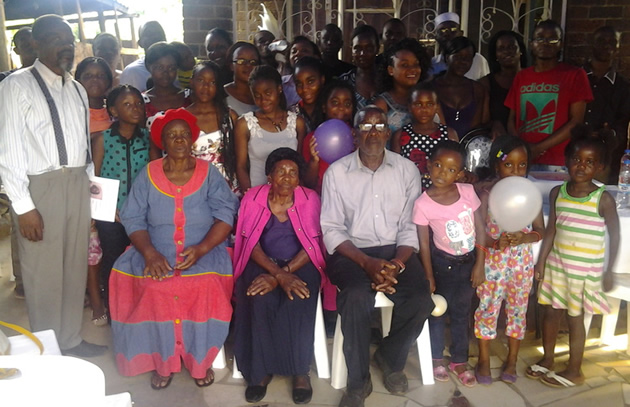100 not out! Centurion celebrates long life

Netilie Marozva and Mary Doma Lifestyle Reporters
A centurion’s trip down memory lane. In this day and age of diminishing life expectancy, it is extremely rare to find someone celebrating a century of life and all praise is left for the Creator for His Grace while others owe it to their lifestyle.
Ambuya Muchaenera Shambwa of Chipinge is one of the people who has proven that age is just a number.
Born on 13 October 1914, the centurion has five children, 33 grandchildren and 47 great grandchildren. She still has the energy and vigour of a youth. The centurion celebrated her birthday on Christmas Day at her Harare granddaughter’s home in Glen View.
Herald Lifestyle caught up with her and she managed to take a trip down memory lane and shared her story about how she grew up and the type of lifestyle that she had when growing up.
While many of us are still wondering what the secret to a long life is, Mbuya Shambwa said that her lifestyle contributed to her long life. She claims that she worked for many years doing jobs that were expected to be done by men. During her entire life, she has never slept in a hospital bed or had a serious illness.
She recalls spending only two years in school. She had to quit school to become a traditional dancer which was her passion.
Mbuya Shambwa said that her marriage had been arranged when she was only eight years old. She said that back then, families would admire a girl so that she would be their daughter-in-law when she grew up. As soon as she grew up, the boy’s family came and claimed their wife!
Having spent years in a polygamous marriage, she decided to divorce her husband and fend for her five children on her own.
“I went and settled at an area called Tamandai which was very bushy and scary since no one else was living there.
It took me three years to clear the land alone and I killed different types of snakes,” said Mbuya Shambwa.
She also said that the field which she cultivated alone back then is the same field that her three children are failing to utilise today.
Due to the fact that there were no buses back then, she worked for cross border traders carrying their luggage for long distances and had to travel the whole day.
She said that she first saw a bus when she had given birth to her last born in 1954. It was a scary experience for her and everyone else and they had to run away every time they saw the buses.
She left for work very early in the morning without eating anything and on better days, she ate porridge made from water which was drained from maize soaked overnight.
Mbuya Shambwa also said that the type of food she ate as she grew up gave her the strength to carry on each day and it is also the reason why she is still surviving today.
“We did not know that diseases like diabetes and heart diseases existed in the past, I only came to know about them recently. We did not use fat or sugar for cooking. We ate sadza rezviyo (millet), derere (okra), tsine (black jack leaves) and muboora (pumpkin leaves).
“When preparing the relish, we added salt and grounded nuts for taste. We also ate dried bush meat which was boiled and salted,” said Mbuya Shambwa.
She also recalls the first time she tasted sugar. She pointed at her eight-year-old great granddaughter and said that she was about that age when her relative let her taste it and she could not get enough of it.
When asked if Christmas in the past was similar to today’s, she said that there is no similarity at all.
“Christmas was mainly associated with family gatherings and traditional ceremonies. I was a singer and a dancer and on Christmas Day, we would gather around drinking beer and we would also dance and sing traditional songs.
“I was also hired by many people to gatherings to entertain them. We would also prick each other’s faces to create black spots which made us more beautiful. We also pierced our ears and wore earrings for decoration. Men also wore earrings because it was part of our Ndau tradition. I think that the white men who wear earrings nowadays copied from us.
“These days, people just go out to drink with their friends and lose their behaviour. The spirit of giving is also lost. I like Christmas these days better though because there are a lot of sweet things to eat and nice clothes to wear, ” she said with a chuckle.
Her granddaughter, Chipo Danha said that her grandmother resents staying in the city.
“She said that if she continues staying here in the city, when she dies, we will bury her here which is something that she does not like. She wants to be buried where she was born,” said Mrs Danha.
Her grandson, Stanley Sithole also said that she gave her children names according to the situations she was in.
The centurion still hopes to live for many more years because she is well taken care of and surrounded by her family. She feels that she is capable of surviving for a very long time.








Comments